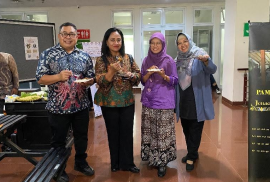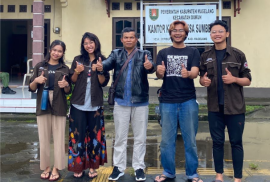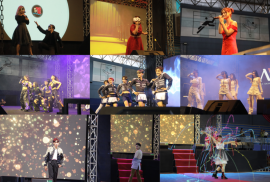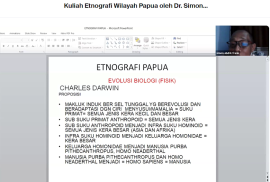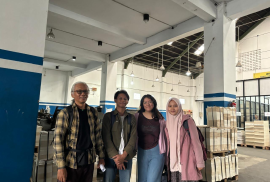Philology, as the study of manuscripts and classical texts, plays an important role in preserving the cultural and historical heritage of a nation. One of the interesting aspects of philology is the effort to understand and translate manuscripts, which means transforming ancient texts from their original format to new forms that are more accessible and easier to learn, such as in the form of illustrated stories, batik cloth, and so on.
Paleography is a scientific discipline that studies the character of ancient writings in manuscripts. As a science that supports the specialization of Philology, Paleography is a compulsory course for the Language, Literature and Culture Study Program.

Picture 1 Excerpted in full from: hystoryana.blogspot.com
On Friday, December 6, 2024 the Javanese Language, Literature and Culture Study Program held an exhibition initiated by the lecturers of the Philology course, Dr. Sri Ratna Saktimulya M.Hum,. and Dr. Arsanti Wulandari M.Hum,. The exhibition involved Master of Literature students in the Philology course and the undergraduate students of Javanese Language, Literature and Culture Study Program for the Paleography course. The philological exhibition “Mengalih Wahana Naskah” aims to introduce the public to the importance of ancient manuscripts in the formation of Indonesian history and culture. The manuscripts not only serve as historical documents, but also as a means of understanding the noble values and wisdom passed down by our ancestors. This exhibition also explores how these manuscripts transformed from handwritten texts into more attractive illustrated texts and wearable batik cloth. It is a means to introduce to the public that ancient manuscripts are not just text documents, but also works of art that contain high aesthetic value.

Picture 2 Students of the Javanese Language, Literature and Culture Study Program in the Philology Exhibition
“Very happy to be able to organize this exhibition, previously we, the class of 2023, were asked to make batik cloth, then it will be exhibited today, it’s fun to try making batik cloth and at the same time get a grade for the Final Semester Examination” said Muhammad Rizki, one of the students of the Language, Literature and Culture Study Program.
The exhibition showcased batik cloths that had previously been made by students of the Javanese Language, Literature and Culture Study Program in the Switching Workshop. The long sash batik cloths were written based on the interests of each student. There are 3 scripts that can be chosen to write the proposition sentences that have been made. Javanese script, Pegon script, and Balinese script, each has its own uniqueness and beauty. Dr. Arsanti Wulandari M.Hum, revealed that this project will be taken as the fulfillment of the Final Examination of Paleography course in 2024. There are also illustrated stories made by Master of Literature students.

Picture 3 Students of Javanese Language, Literature, and Culture Study Program Make Batik for the Exhibition
It is hoped that the Philology exhibition: Alih Wahana is able to introduce many people to the existence of Philology as a useful science for life. Ancient manuscripts can be absorbed with the science of Philology to prepare for present and future life. In addition, this exhibition is one way to preserve ancient manuscripts in Javanese culture.

Picture 4 Group photo at the Philology Exhibition
[Public Relation FIB UGM, Sandya Kirani]

